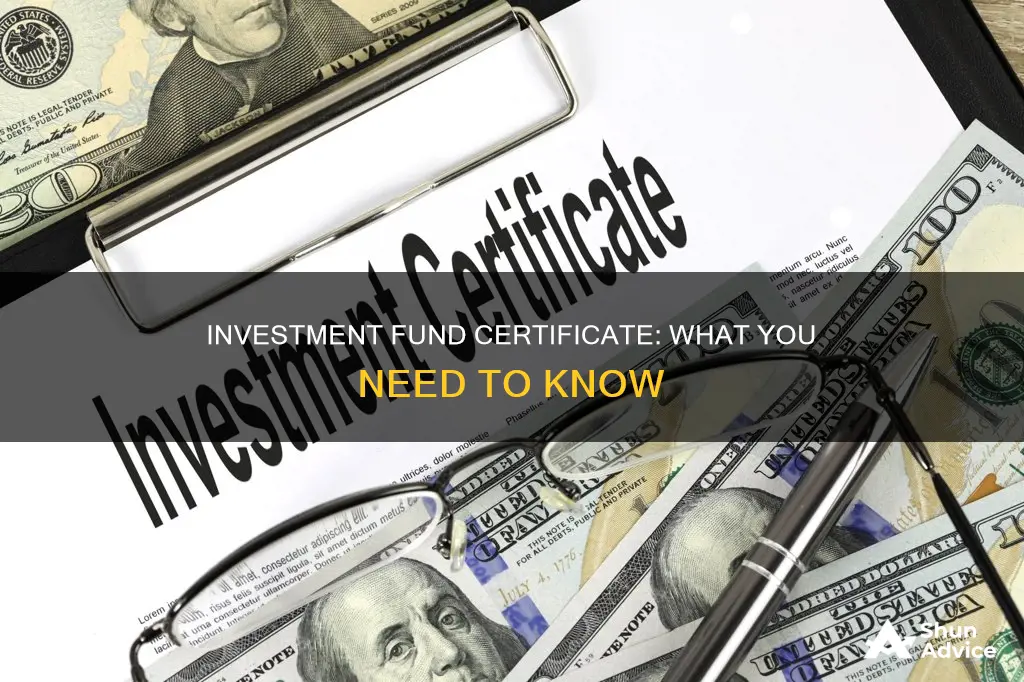
Investment certificates are financial products offered by investment companies or brokerage firms that allow investors to deposit a specific amount of money and earn a guaranteed interest rate over a predetermined period. The concept, first introduced in 1894, enables investors to diversify their portfolios and access a variety of underlying assets, such as equities, commodities, bonds, and indexes. These certificates fall under the category of 'structured products', designed to align with the investor's goals and risk tolerance. They are distinct from certificates of deposit (CDs) offered by banks, as they are classified as investments and are not typically insured by government entities.
Characteristics of Investment Fund Certificates
| Characteristics | Values |
|---|---|
| Definition | A financial product that provides the holder with a right or claim on the returns generated by a particular asset or a pool of assets |
| Asset Types | Equities, commodities, bonds, indexes, or a combination |
| Issuers | Financial institutions such as banks or investment companies |
| Types | Equity-Linked Certificates, Index-Linked Certificates, Commodity-Linked Certificates, Interest Rate-Linked Certificates, Mutual Investment Certificates |
| Benefits | Diversification, flexibility, accessibility to various markets or assets |
| Risks | Underlying asset performing poorly, lack of liquidity, complexity |
| Purpose | Diversify portfolios, harness benefits of underlying assets, competitive yield with added safety |
| Other | Bearer bond without leverage, no regular revenue, specified redemption amount, proof of investment in savings and loan association |
What You'll Learn

Investment certificates vs certificate of deposit
An investment certificate is an investment product offered by an investment company or brokerage firm, designed to offer a competitive yield to an investor with the added safety of their principal. It allows the investor to earn a guaranteed interest rate for a predetermined amount of time.
A certificate of deposit (CD), on the other hand, is a type of savings account that pays a fixed interest rate on money held for an agreed-upon period. CDs are considered a safer and more conservative investment option than stocks and bonds but offer lower growth opportunities. They are insured by the Federal Deposit Insurance Corporation (FDIC) and are available at banks, credit unions, and brokerages.
One key difference between investment certificates and CDs is that investment certificates are not insured by the federal government or the FDIC. Withdrawals from investment certificates must also be reported to the Internal Revenue Service on individual investor tax returns, which is not the case with CDs. Additionally, investment certificates typically have lower surrender charges for early withdrawals compared to CDs, and they offer a longer grace period between terms.
In terms of flexibility, some investment certificates allow for frequent deposits and withdrawals without penalty, while CDs generally do not. CDs require an initial deposit that remains in the account until its maturity date, and early withdrawals incur penalties. However, CDs can be a good option for those seeking a conservative investment strategy or looking to save for specific goals without the temptation of spending the funds.
Setting Up an Investment Fund: Luxembourg's Guide
You may want to see also

Types of investment certificates
Investment certificates are financial instruments designed to offer investors a competitive yield with the added safety of their principal. They were first introduced to the public in 1894 by John Elliot Tappan, the founder of the Investor's Syndicate, today known as Ameriprise Financial.
The price of an investment certificate is derived from its underlying asset, which can include stock indexes, shares, commodities, currencies, and more. They are issued by large banking houses, and the creditworthiness or rating of the issuing banking institution plays an important role.
- Discount Certificate: This type of certificate may provide a discounted price for purchasing the underlying asset.
- Commodity Certificate: This certificate is likely linked to commodities as the underlying asset, such as raw materials or agricultural products.
- Guaranteed Certificate: This type of certificate offers a guaranteed interest rate for a predetermined period, providing a secure investment option.
- Reverse Bonus Certificate: This certificate may provide a bonus under certain conditions, but the specifics are not readily available.
- Mutual Investment Certificate: Issued by a local authority, this certificate assesses a tax on a community to fund a public works project that will benefit the same community. Income from this type of certificate is generally tax-free for the recipient.
ETFs vs Index Funds: Which is the Better Investment Option?
You may want to see also

Benefits of investment certificates
An investment certificate is an investment product offered by an investment company or brokerage firm designed to offer a competitive yield to an investor with the added safety of their principal. They allow the investor to make an investment and earn a guaranteed interest rate for a predetermined amount of time.
Guaranteed Interest Rate
One of the main advantages of investment certificates is the guaranteed interest rate that investors can earn. This provides a level of certainty and security, knowing that their investment will generate a specific return over a specified period.
Principal Protection
Investment certificates prioritize the security of the investor's principal amount. This means that the original sum invested is protected, and investors can have peace of mind that their capital is safe, even if the investment doesn't perform as expected.
Flexibility
Investment certificates offer flexibility in terms of deposit and withdrawal options. Some certificates allow for frequent deposits and withdrawals without penalties, providing liquidity to investors. Others may follow rules similar to a certificate of deposit, where investors can choose a term length, typically between 3 months to 3 years, and still earn a guaranteed interest rate.
Competitive Yield
Investment certificates are designed to offer competitive yields to investors. This means that investors have the opportunity to earn higher returns compared to other investment options, making it an attractive choice for those seeking to maximize their returns.
Community Impact (Mutual Investment Certificates)
Mutual investment certificates, issued by local authorities, provide a way for communities to finance public works projects that benefit the area. These projects can include entertainment facilities, health and safety initiatives, or developments that promote employment and education opportunities. By investing in these certificates, residents can directly contribute to the improvement and expansion of their community, potentially increasing the desirability and property values of the area.
In summary, investment certificates offer a combination of guaranteed returns, principal protection, and flexibility, making them a compelling option for investors seeking competitive yields with added security. Mutual investment certificates further extend the benefits to the community by funding initiatives that positively impact the quality of life and economic landscape of the region.
Who Invested in FTX? Exploring the Backers of FTX
You may want to see also

Risks of investment certificates
Investment certificates, also known as fund certificates, are a popular form of investment. They are offered by investment companies or brokerage firms and are designed to offer a competitive yield to an investor, with the added safety of their principal.
However, as with any investment, there are risks involved. Here are some of the potential risks associated with investment certificates:
- Market Risk: Investment certificates, especially those tied to the stock market or specific indexes, are subject to market risk. This means that the value of the investment can fluctuate with market conditions. If the market declines or the specific index underperforms, the investment certificate may lose value.
- Interest Rate Risk: Investment certificates offer a guaranteed interest rate for a predetermined amount of time. However, if the overall interest rates in the economy change significantly during that period, investors may find that their returns do not keep up with the market rates, resulting in an opportunity cost.
- Liquidity Risk: While some investment certificates offer liquidity, allowing frequent deposits and withdrawals without penalty, others have more restrictive rules. Investors locked into less liquid certificates may face challenges if they need to access their funds early. Early withdrawals may incur penalties or fees, reducing the overall return on investment.
- Credit Risk: Investment certificates are not insured by the federal government or the Federal Deposit Insurance Corporation (FDIC). This means that, unlike traditional bank deposits, there is a degree of credit risk associated with the financial institution offering the certificate. In the event of the institution's failure or insolvency, investors may lose their principal.
- Tax Implications: Unlike a certificate of deposit (CD), surrenders or withdrawals from an investment certificate must be reported to the Internal Revenue Service (IRS) on the individual investor's tax returns. This adds a layer of complexity to the investment and may result in unexpected tax liabilities for investors who are not aware of this requirement.
- Management Risk: Investment funds that issue certificates are typically managed by fund management companies. Investors do not have day-to-day control over investment decisions. Poor management or investment strategies that do not align with an investor's goals could lead to underperformance or losses.
- Project Risk (for Mutual Investment Certificates): Mutual investment certificates are used to fund public works projects intended to benefit the community. However, there is a risk that the project may not deliver the expected positive impact on the community or boost desirability and property values as anticipated. This could affect the potential return on investment for residents who supported the project through these certificates.
Retirement Planning: Target Funds, Worth Your Investment?
You may want to see also

How to purchase investment certificates
An investment certificate is an investment product offered by an investment company or brokerage firm in the United States. It allows investors to earn a guaranteed interest rate for a predetermined amount of time. The specifics of the product can vary depending on the company selling the certificates, but the common factor is the security of the investor's principal.
- Find a Brokerage Firm or Investment Company: The first step is to find a reputable brokerage firm or investment company that offers investment certificates. Research different companies and compare their products, terms, and conditions.
- Understand the Terms and Conditions: Before purchasing an investment certificate, carefully review the terms and conditions provided by the brokerage firm or investment company. Pay close attention to the guaranteed interest rate, the predetermined time period, and any associated fees or penalties for early withdrawal.
- Determine the Investment Amount: Decide on the amount of money you want to invest in the certificate. Some companies may have minimum or maximum investment requirements, so make sure to review their guidelines.
- Complete the Necessary Paperwork: The brokerage firm or investment company will provide you with the necessary paperwork to purchase the investment certificate. Carefully review and complete all the required documents, providing accurate and up-to-date information.
- Fund the Investment Certificate: Once the paperwork is in order, you will need to fund the investment certificate by transferring the selected sum of money to the brokerage firm or investment company. The methods of payment may vary, so clarify with the firm or company about the accepted payment options.
- Monitor and Manage Your Investment: After purchasing the investment certificate, it's important to monitor its performance and stay updated on any changes in the interest rate or market conditions. Keep track of the maturity date, which is when your principal and interest will be returned to you.
Remember that investment certificates may have different levels of liquidity, so clarify any restrictions on deposits and withdrawals before purchasing. Additionally, unlike certificates of deposit (CDs), investment certificates are not insured by the federal government or the Federal Deposit Insurance Corporation, and surrenders must be reported to the Internal Revenue Service on your tax returns.
A Guide to Investing in Nifty 50 Index Funds with Upstox
You may want to see also
Frequently asked questions
An investment fund certificate is a financial product that allows investors to diversify their portfolios and access a variety of underlying assets, such as equities, commodities, bonds, and indexes. It provides the holder with a right to claim returns generated by these assets.
Investment fund certificates offer investors several benefits, including diversification, flexibility in asset choices, and accessibility to various markets or assets that might otherwise be difficult to invest in directly. They also provide a competitive yield with the added safety of the principal amount.
The main risk of investment fund certificates is that the performance of the underlying asset(s) may be poor, leading to potential losses. Additionally, some certificates may lack liquidity, making them difficult to sell without incurring significant losses. It is crucial to understand the structure and risks of these complex products before investing.
Investment fund certificates can typically be purchased through financial institutions such as banks or investment companies that issue them, or through brokerages that offer these products. It is recommended to seek advice from a qualified financial professional to ensure the investment aligns with your financial goals and risk tolerance.







